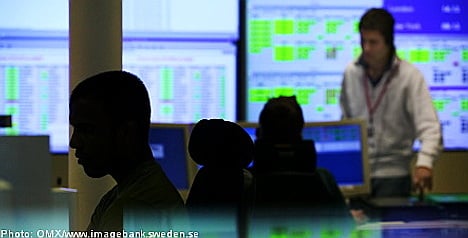At the close, the OMXS-index had fallen 6.2 percent to 283.1, while the OMX30 was off 6.7 percent, closing at 870.4.
A few minutes into trading on Thursday morning the OMXS-index was down by one percent. The fall was broad as all indexes dropped, and companies which saw the highest trading volume were nearly all down.
The fall on the Stockholm stock exchange as well as that in the rest of Europe grew over the course of the morning. By 11am the OMXS-index had dropped by almost three percent.
Primarily, shares in the recession-sensitive manufacturing sector were down, falling by 4-5 percent as fears mounted about slowing global growth.
Among the companies whose shares were traded the most, Volvo AB’s B-shares were down by 6.1 percent by 3.30pm, followed by H&M and Ericsson shares, both down by 2.5 percent by the afternoon.
Bank shares are also suffering. By 4pm Swedbank had plummeted by 10 percent. Handelsbanken shares fell by over 7 percent, Nordea by 8.3 percent and SEB by 8.9 percent.
The fall grew in force over the afternoon at the leading stock exchanges all over Europe during Thursday afternoon following sombre US stats.
The US investment bank Morgan Stanley warned on Thursday as well that the world economy was “dangerously close to a recession” in its growth forecast for 2011 and 2012.
In Frankfurt the DAX index had fallen by 5 percent shortly before 3.30pm. In Paris the CAC index had fallen by 4 percent and the London exchange had lost 3.4 percent of its value by the afternoon.
Meanwhile the price of gold rocketed, up 1.6 percent on the day to $1,816.09 an ounce on the world market.
The rise was due to increasing numbers of investors moving their money into what is as a safe haven for investors during turbulent times.



 Please whitelist us to continue reading.
Please whitelist us to continue reading.
Member comments